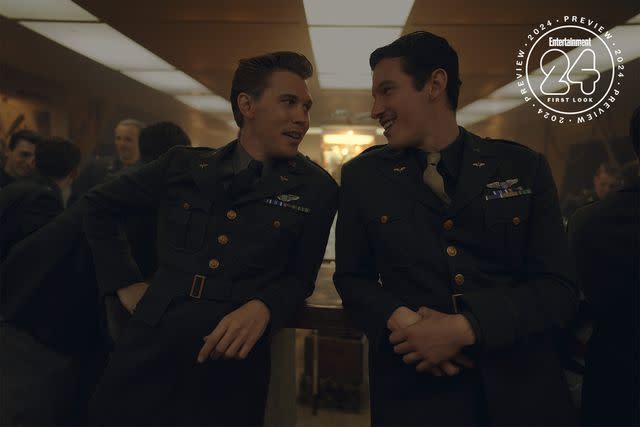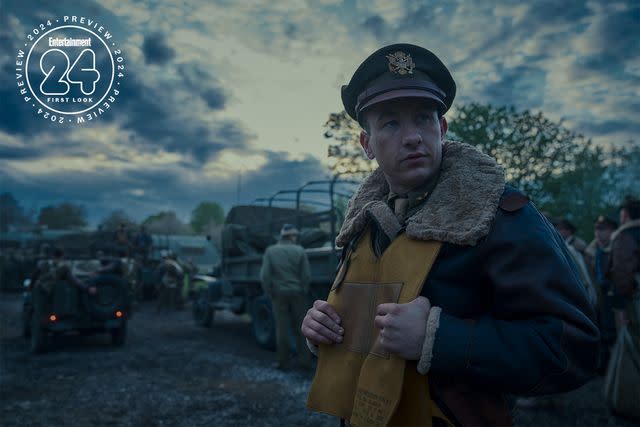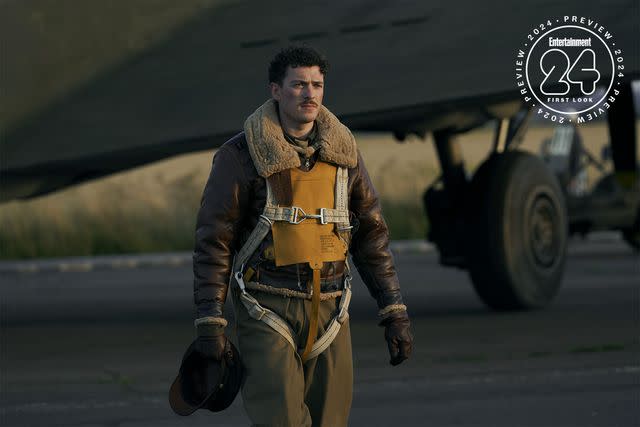In “Masters of the Air”, Austin Butler and Callum Turner turn their eyes to the skies of World War II
Butler, Turner, and producer Gary Goetzman preview their new WWII miniseries, a companion piece to "Band of Brothers" and "The Pacific"
The Masters of the Air cast went through mini-boot camp, history classes, and sessions in the flight simulator to prepare for their roles as World War II fighter pilots. But the thing that required the most endurance? Their (not officially sanctioned by production) cockpit contest.
“It was a game that we played and that the real guys played too,” explains Callum Turner (Fantastic Beasts). “No one wanted to take the stairs to get up into the plane. You basically had to do a reverse pull up and swing your body up into the hatch, which isn't an easy thing to do when you've got all the flight equipment on.”
Turner says the game turned highly competitive between him and costars Austin Butler, Nate Mann, and David Shields as they raced to see who could pull themselves up into the replica B-17s the fastest. “From the ground, you have to throw your legs up inside [the plane] and climb up,” adds Butler. “It's really tight there, and then you get into the cockpit.”

Apple TV+
Austin Butler and Callum Turner in 'Masters of the Air'Shockingly, no one was injured beyond the minor bumps and bruises from their tendency to bang their heads on the side of the plane. Butler sheepishly admits he won, after Turner bemoans his lack of prowess. “Austin was the quickest,” Turner says. “To get into the plane and then into the pilot seat, he did that in about four and a half seconds. Unfortunately for me, I did it in 5.2. It’s obviously a stain on my legacy.”
While Turner might have a black mark on his legacy, Masters of the Air is here to shine a light on that of the 100th Bomb Group of the U.S. Army Air Forces, also known as the “Bloody Hundredth.” Produced by Gary Goetzman, Tom Hanks, and Steven Spielberg, the series, which premieres on Apple TV+ on Jan. 26, is the companion piece to their previous World War II miniseries, Band of Brothers and The Pacific.
Based on the book Masters of the Air: America's Bomber Boys Who Fought the Air War Against Nazi Germany by Donald L. Miller, the series will complete their trilogy of WWII dramas by turning its eyes to the skies. “We had never tackled war in the air,” says Goetzman. “After being inspired by Don's book, it was time to attack that. Steven’s always had a great desire for us to do the air war in Europe. His dad was a pilot. He was very knowledgeable about the planes and the way battles were fought.”
Filming began over three years ago, while COVID-19 restrictions were still at their high point. But Goetzman and the team have practically earned a military commendation for producing these stories at this point. So, they started with their tried and true method — boot camp and total immersion in the era.
Captain Dale Dye, who also advised on Band of Brothers and The Pacific, led a two-week training regimen for the cast. “I'd heard him speak for so many years on the DVD commentaries of films like Saving Private Ryan and Platoon,” says Butler. “So, to be honest, I was a bit starstruck by him. He led the entire experience, and it was everything from marching and learning how to salute to physical boot camp with tons of push-ups, sit-ups, and running. There was also time in the classroom where we were learning about World War II and the 100th bomb group. And then there were flight simulators and time to get as acquainted as possible with the cockpit of a B-17.”

Apple TV+
Barry Keoghan in 'Masters of the Air'While the casts of Band of Brothers and The Pacific often shot on location and endured rough weather conditions, Masters of the Air relied heavily on technology and the immersive visual effects tool known as the Volume. This meant that the cast had to turn to other resources to bring the lived experience of their characters to the screen.
For Butler, who portrays Major Gale “Buck” Cleven, Masters was his first project following Elvis. He confesses that he spent his well-chronicled post-Elvis stint in the hospital reading Miller’s book so as to yank him out of the King’s world and plunge him into Buck’s. “I was soaking in everything that I possibly could to help me shed one skin and pivot into another,” he explains. “The book helped to give a wide view of what was going on and the details of how harrowing it was.”
Both Butler and Turner, who plays Buck’s best friend Major John “Bucky” Egan, also turned to photographs and surviving accounts of the real men they’re portraying. Turner notes that his body type is significantly different from Egan’s, with nearly an entire foot between his 6’2” and Egan’s 5’5”. Instead of trying to lose weight or replicate Egan’s appearance, he instead decided to build the man from the inside out. “I wanted to get his essence, rather than trying to mimic him in any way,” he notes. “I wanted to see how — through his energy, his diet and how he lived his life — how my body would manifest from that behavior. Which was fun because he ate a lot of crap and drank a lot.”
Butler found inspiration in surviving footage of Cleven. “When he was in his 80s, a family member had filmed him and interviewed him about his time as a bomber pilot,” Butler says. “It helped me a lot with his cadence and with his dry sense of humor and being a man of few words. Also how focused he was and how precise he was and how much he loved his wife. That love that carried him through the [war] really taught me a lot.”

Apple TV+
Nate Mann in 'Masters of the Air'No such footage exists in Egan’s case, so Turner instead turned to idiosyncratic details of the man’s life, like his love of Damon Runyon’s Guys and Dolls stories and Egan’s identity as an Irish Catholic. Turner listened to traditional Irish music throughout the process and found Egan’s voice in the man's passion for the Big Apple. “He was obsessed with the Yankees,” Turned adds. “He was obsessed with New York even though he'd never been. He had this phony New York accent or his idea of what a New York accent would be that he'd created from his love of the Yankees and his love of these tales in the Runyon book.”
But the biggest challenge of the show for every actor was the cognitive dissonance of the horrors the men faced in the air juxtaposed with their rather more cosmopolitan nightlife. “At one point the statistic was that only one in four men would make it back,” details Butler. “There’s the psychological horrors of that reality. If you're an infantryman and you're in it every day, there's a different type of psychological warfare that's taking place as opposed to you going out to dinner in London for the night and then having to go back out the next day. The combination of those two polar opposites can take its toll on people's psyche.”
That dichotomy will be probed throughout the nine-episode series. Though Goetzman hopes that above all, viewers walk away with an understanding of the sacrifice and valor of the men fighting the war from the air. “The battle in the air was unique and changed the course of the war and history,” he concludes. “The dedication of these young men was instrumental in our eventual victory.”
Sign up for Entertainment Weekly's free daily newsletter to get breaking TV news, exclusive first looks, recaps, reviews, interviews with your favorite stars, and more.
Related content:
Austin Butler is finally 'getting rid' of his Elvis accent: 'I have probably damaged by vocal cords'
Watch Austin Butler and Tom Hardy jump on motorcycles and kick ass in The Bikeriders trailer
Read the original article on Entertainment Weekly.
